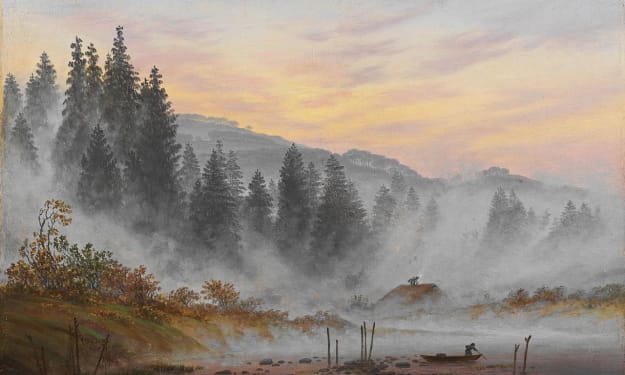
Somewhere in the midwest, 1947
When Israel was in Egypt’s land
CLANG
let my people go
CLANG
‘pressed so hard they could not stand
CLANG
let my people go
I pause, taking a moment to rest my chin against the handle of my hammer. The sun beats down ceaselessly, and I feel yet another bead of sweat run down my forehead. I glance down the chain gang, where the faint humming of an engine has manifested by way of an open-back truck. It pulls up to the dig site, sending a cloud of dust up our way, and two guards exit from the cabin, brown uniforms and wide-brim hats. One raps on the back of the truck and a fresh line of young men sally forth, the chains on their limbs clanking with a rattle I can hear all the way from here. Their uniforms are clean, no dust or mud to speak of, black-and-whites untainted. This is their first line.
Thus saith the Lord, bold Moses said
CLANG
let my people go
CLANG
oh, if not, I’ll smite your first-born dead
CLANG
let my people go
The boys stumble over to the line, prodded and poked by the guards that accompany them. It is difficult to see from this distance, but some of them look young enough to be teenagers. A shift in weight, tugging on the chain at my legs, and in moments I hear new voices join the chant, their hammers swinging in a disjointed rhythm. It is mere seconds before they match the tune, and the clanging becomes even once again. Isaac next to me looks up from his place on the rail, face glistening with sweat.
“What d’you reckon?” he asks, gaze flicking over to the newcomers. “Fifteen days? Sixteen?”
“Twenty-five.” I mumble. “Ain’t no chain gang gets new boys added fifteen days out.”
No more shall they in bondage toil
CLANG
Let my people go
CLANG
Let them come out with Egypt’s spoil
CLANG
Let my people go
The desert stretches out behind us, unfathomably vast. Ahead the rail lines reach into the distance, and behind it is the same. There is no shade, merely a small rise of orange rock opposite the rail. Atop it stands one of the guards, a pale little figure against the blue sky. A hat lies low on his head, and sunglasses hide his eyes. In his hands is a submachine gun, a Model 1928 Thompson, fitted with a box magazine, capable of spitting some 800 rounds per minute. I know this because I used one, over in Germany.
There are maybe fifteen guards like him, all stationed around the work site, for vastly more workers. We are maybe a hundred-and-twenty strong now, all black men working on this section of rail. We shatter rocks, lay boards, and drive the spikes into the earth. It is back-breaking work, but it’s what we do. We are all criminals, after all. Or that’s what they tell us.
The guard with the sunglasses angles his face towards me, as though he feels my gaze upon him.
“What in the god-damn hell are you sluggards doing down there!? Hit those rocks, boy!”
Isaac and I raise our hammers together, joining the chorus once more.
The Lord told Moses what to do
CLANG
Let my people go
CLANG
To lead the Hebrew children through
CLANG
Let my people go
-
Half-an-hour passes, though it feels longer, as it always does. Finally, a guard on horseback trots his way along the line, a rifle in his hand, and sends up the call; “Pause from labour!”
It is time for reprieve - bread and water. We leave our hammers by the line and wait for the guards on foot to come past, unlocking our chains, not that there is any point to locking them in the first place. Where would we run, all the way out here with no transport? I shake my legs, rotating my ankles to get the feeling of heavy iron out, before Isaac and I begin the walk over to the truck, watching the throng congregate around it, new boys at the forefront. We do not hurry, we know that they will be the most desperate for water. Emilio jogs up from the back of the line to meet Isaac and I, giving me a friendly shove.
“Look at this guy, getting the white fellas all riled up. Good of you to leave the real work to us big strong boys, ah fré?”
I push him back, breaking into a grin.
“Excuse me, John Henry, but have you seen my friend Emilio? About -so- high, a real wise-ass?”
Isaac too delivers a small smile at our banter, though it is soon purged from his face as the clop-clop of horseshoes sounds from behind us.
“Keep it down, prisoners, save the chatter for your free time.”
We walk on to the food truck in silence, though with sideways glances and stolen smiles. Three steel drivin' men, bound with iron and sweat.
Isaac was one of the first friends I made on the line, by way of him also fighting in the war. Not against the Nazis, mind you - he was in the pacific, against the Japanese. Bad stories came out of that fighting, and Isaac does not talk about it. I can’t blame him, though soldiers like us always feel more comfortable around each other. Emilio was a mechanic, born in Haiti. He lived as a proud, free man, until he came to the states in ’46 and was picked up right at the border. Didn’t matter that he had the right papers. He just hadn’t learned to walk the walk or talk the talk, and that was enough.
Strong, good men, the both of them, and out here on the arid plains, you want men like them at your side.
We sit in the lee of an orange boulder, picking at our stale rolls halfheartedly. Isaac nudges Emilio's foot and casts a hand off in the direction of the rail.
"How long d'you reckon?" he asks, prompting an eye-roll from the larger man.
"Are you still on this? How would I have any idea?"
"Alex reckons the new boys mean twenty-five days."
Emilio shrugs. "Then it's probably twenty-five days. You're the Army Engineer, you tell me, monchè."
We are quiet for a time. How long it will be until the rail is complete and we're released is always a point of discussion, but all three of us know that they'll likely find some other menial task for us to do. Anything to keep us off the streets and away from god-fearing white folk. A ways away I see three of the guards gathered around the food truck, almost a mirror image of us, divided along lines of uniform and complexion. One of them is the fellow from the ridge, sunglasses on his eyes. He is eating sandwiches and drinking coffee, chatting with his friends, sparing no glances for the prisoners gathered around the dusty rocks and desert scrub.
"Good eats, mm?" Emilio mumbles, attempting to get his mouth around the rock-hard bread. Isaac and I chuckle, on cue. Good eats is a running joke, one of those things you cling on to in times of hardship.
"Mama didn't raise no gum-toothed boy, now eat your wòch, Emilio."
The big Haitian throws back his head and cackles, as he always does when I use his language, and the sound causes one of the new boys to turn in the dust nearby. Boy is truly the right term for him, short and gangly. He is maybe nineteen, standing awkwardly, clearly with nowhere to go, and I wave him over. He gives me a nod, and a little smile.
“Come boy, sit, what’s your name?” I ask, indicating the space next to me with my head. He stumbles over, and settles down at a respectable distance, clutching at his morsel of bread. He flicks his eyes up at me, then back at the ground.
“Thomas… sir.” he says quietly.
Emilio gives a guffaw, and even I cannot conceal my amusement.
“Okay,” I manage. “Sir.” I clap a hand on his shoulder, attempting to break the ice, and indicate my friends.
“I’m Alex, the quiet fella there is Isaac and the big son-of-a-gun is Emilio.”
The men raise their hands in turn, and Thomas nods at them politely.
“Hey, why are you here, little fré?” Emilio asks, leaning around my frame.
Thomas is silent for a time, while Isaac and I exchange a glance with Emilio. Most men on the chain like to make up elaborate plots so as to vivify their mundane arrests, but occasionally there would be an actual criminal among the mix. When the boy finally opens his mouth to speak, it is with obvious misgiving.
“My, uh, my parents wanted to send me to a college in New Orleans.”
We all pause, expecting him to say more, but nothing else passes his lips.
“…and?” Emilio asks, accruing another glance from Isaac and myself.
“That’s all.” Thomas says. “Someone called the cops when we arrived.”
We are all quiet for a moment.
“Shit.” Isaac finally mumbles, breaking the silence. “Sorry, kid.”
Thomas coughs, dust caught in his throat, but makes no other comment. He doesn’t need to. In this country, white folk will snap at you for walking too close to them, and the cops’ll come in force if you stroll into the wrong shop. Hell, most men on the gang were arrested for some made-up bullshit, but we were full-grown men. White folk liked to keep us off the streets, or we'd sully their idyllic neighborhoods. To take a kid, on the other hand, outside a college, no less...
“You’ve got a good work song.” Thomas says finally, changing the subject. “The Contrabands. Harriet Tubman. Go Down Moses. Underground railroad. It’s… relevant.”
Another cloud of dust shifts past us, and the horseback guard shouts once more; “Resume labour!”
-
Oh come along Moses, you’ll not get lost
CLANG
Let my people go
CLANG
Stretch out your rod and come across
CLANG
Let my people go
Hours more pass, and my rough hands begin to bleed from the hammer’s splintered wooden shaft. It is hardly painful, the sensation long since blocked out from repetition, but I think of Thomas, with Emilio down the end of the line, his soft hands made for writing, eyes for studying. I think of how he must be frightened, must miss his parents, must be wondering when it will end. I will him to hold on, to keep pushing day by day. It’s all any of us can do.
The sun is lowering in the sky, and I raise my hammer again to the shattered earth, driving that railroad spike into the stone. The vibrations ring in my arms with every falling blow, but I keep on pushing, again and again and again. When I am done with this one I will break the next lot of stone, lay the next lot of boards, and hammer the next load of spikes. I raise my hammer again, hit the spike again, raise, hit, raise, hit.
As Israel stood by the waterside
CLANG
Let my people go
CLANG
At god’s command it did divide
CLANG
Let my people-
Shouting from the end of the line. I hear the voices of both prisoners and guards, but I cannot see the commotion. Isaac stops work next to me, along with several other men nearby. All of us are glancing around, unsure as to what exactly has happened.
“What d’you reckon?” he asks again, and I merely shrug in response. I know we are both thinking of Emilio and Thomas, down in the thick of things.
Quite suddenly there is a flash of white and black from down the line. Four men, four prisoners, beelining across the desert, free of their shackles.
“Stop now or I’ll shoot!” Comes the voice from up on the ridge. The men power on, their legs pumping like machines, desperate for their freedom.
“Let em’ have it boys!”
I clutch at my ears as the rtrtrtrtrtrtrtrtrtrtrt of the Thompson rings out. Screams sound from down the line, men caught in the crossfire.
For a moment I am back in the Rhineland, my finger on the trigger, hot metal spewing past my face. A man in a grey uniform clutches at his chest ahead of me. Blood soaks the soil. He chokes down a sob. I raise my gun.
“Mutter… es schmerzt… mutter…”
I squeeze, and I am back in the desert. There is no gun in my hand, just the sledgehammer. Out in the dust lie four bodies. I watch as a guard walks over to the rearmost one, weapon in hand. The body reaches up, mouth moving, but I am too far away to hear what he is saying. The guard raises the weapon, just like I did three-odd years ago, and one more shot rings out.
The desert is quiet for a moment, but the barking of the guard on the ridge interrupts the sickening silence.
“Back to work, prisoners!”
Isaac and I raise our hammers together, as more guards descend on the corpses, dragging those prisoners caught in the gunfire away from the line to join the bodies in the desert. I pray to myself that Thomas or Emilio are not among them. My hammer falls to the spike once more, and I listen to the chant, though this time I do not join in. My heart is heavy and my guts clench.
When they reached the other shore
CLANG
Let my people go
CLANG
They sang a song of triumph o’er
CLANG
Let my people go
CLANG
I think of the past, and the future as I work. The Contrabands. Harriet Tubman. Moses. Maybe the chain gangs will march on forever, breaking, building, serving the state, feeding a system of injustice.
We must push on. God help us, we push on.
Go down Moses
CLANG
Way down in Egypt’s land
CLANG
Tell ol’ Pharoh
CLANG
Let my people go
About the Creator
boshmi
I write short stories every few weeks or so, mostly inspired by early modernist literature. These are the ones I like the best.






Comments
There are no comments for this story
Be the first to respond and start the conversation.